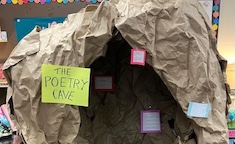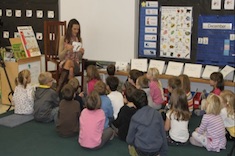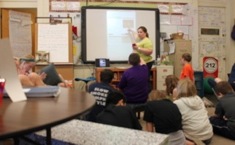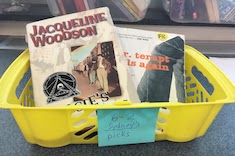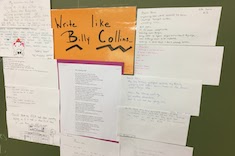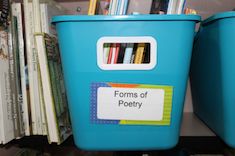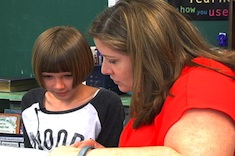Poetry
We all need more poetry in our lives, and time spent with poems in classrooms is what many students carry away and cherish years after they've left our schools. Here are resources to help you bring more of the delights of poetry into your classroom and school.
Latest Content
Why High School Students Need Cardboard Castles and Poetry Caves
Gretchen Schroeder makes a case for offering creative opportunities for high school students to play with language. She names three components to ensure a creative, playful experience is successful: student choice, ownership, and inspiring invitations.
Rhyme and Reflect: Fostering Fluency Through Poetry
Joanne Emery recommends using poetry to help children practice their oral expression. She offers many poetry books and strategies for fluency practice.
Love Poetry: Take It or Leave It, but Tell Me Why
In today’s world we are bombarded with opinions that are increasingly polarizing, and this is especially true for teens and their opinions of love poems. Gretchen Schroeder uses love poems to help students learn how to back up an opinion with criteria, details, and examples.
A Poetic Beginning
Tara Barnett and Kate Mills use poetry to help students discover writing ideas. Inspired by three poems, students share their notebook entries and poems from the first days of a new school year.
Informational Poetry
Hannah Tills and Josie Stewart teach students to write informational poetry. They remind us that poetry can serve as a mentor text in many units and does not have to be siloed in its own unit.
Step Into Poetry: Building a Poetry-Conscious Classroom
Joanne Emery has curated a fabulous list of resources and ideas to build a poetry-conscious classroom community.
Ways to Celebrate National Poetry Month
Gretchen Schroeder incorporates poetry into her high school classroom as much as possible, and in April she makes a plan to go big! Gretchen shares a variety of ways to create memorable and fun experiences around poetry no matter your grade level.
Poetry Friday Stretches Into Poetry Slam
Mandy Robek shares an update to her Poetry Friday routine inspired by the professional book Artfully Teaching the Science of Reading by Chase Young, David Page, and Timothy V. Rasinski. You, too, will want to incorporate this poetry routine into your week.
Poetry Strategies for Partners and Groups
Gretchen Schroeder offers three ideas for partners or small groups to engage with poetry. Not only will they get creativity flowing, but they will also lift writers’ energy.
Three Ways to Engage Your Students in Reading and Writing Poetry This Spring
Gretchen Schroeder offers three poetry-writing activities to take the pressure off the writing process by using another poet’s structure and/or words as a starting point. You’ll be amazed by how deep and personal the resulting poems can become. Download a PDF for students to collect lines for a cento poem.
Poetry Surprises
Mandy Robek delights in the surprises that emerge as her students read, write, and share poetry.
Making Time for Poetry
Gretchen Schroeder encourages teachers to make time for the things that are important. For her, it was poetry, and she outlines how she created a weekly poetry ritual in her high school classroom that enhanced the curriculum.
Poems to Start the Year
Tara Barnett and Kate Mills share poems to start the year that touch a variety of needs, from building community to connecting with colleagues to hosting parents for back-to-school night.
Age Poems
Katherine Sokolowski immerses students in poetry with mentor texts about age and time to linger in thinking about their own ages. This combination invites poetry into classrooms and gives students space to embrace the genre by writing their own age poems.
The Reluctant Marathoner: Reflecting on Student Engagement
Gretchen Schroeder uses her reluctance as a marathon runner to reflect on how to encourage more engagement in reading and writing.
Many Uses for Mentor Texts to Teach Argument Writing
Tara Barnett and Kate Mills share the many targeted ways in which they use mentor texts to teach argument writing and move students away from five-paragraph themes.
Nurturing Independent Reading Lives in Middle School
Tara Barnett and Kate Mills share their favorite strategies for building a classroom community of readers where everyone has several options for choosing their next book.
Poetry Resources for Remote Learning
Poetry can be the glue that holds many virtual classroom communities together. It works for quick morning meeting openings, transitions, or even a bit of laughter when energy is flagging. Cathy Mere shares her favorite poetry resources for remote learning.
Poetry and Pastiche
Tara Barnett and Kate Mills introduce their middle school students to pastiche, a technique of mimicking the craft of favorite poems and poets.
The Curious Incident of Poem in the Stream of Time
Shirl McPhillips shares a haunting poem and reflection on creativity, summer’s inspiration, and aging.
Poetry Path
Gretchen Schroeder outlines a way to involve the entire school community in engaging in poetry.
Things That Can Fly Away—A Tribute to Mary Oliver
Shirl McPhillips honors the poet Mary Oliver upon her passing, reflecting on the power of favorite poems and poets to endure in the lives of writers.
Past Midnight
Shirl McPhillips shares a poem she’s written about her grandmother Eva, and the fragments of memory that inspired it.
The Power of Similes
If you want stronger poetry from students, a good starting point might be to explore how to write a powerful simile. Gretchen Schroeder explains how she helps her high school students play with and create better similes.
Poetry Connections
Poetry writing always has the potential to spark some magic in students. Christy Rush-Levine finds this magic requires a few conditions to be in place first in her middle school classroom.
The Third (or More) Time Is the Charm
Gretchen Schroeder finds helping her students see the value in rereading poems is all about helping them pay close attention to imagery.
Pick a Poem
David Pittman delights in a student’s enthusiasm for poetry, leading him to reflect on how teachers often need to overcome their own negative history with poems to spark student love of the genre.
A Poem About Lost Friendship: Conferring with Estelle
Estelle shares a poem she has written about lost friendship with her teacher, Katherine Sokolowski. She captures the fickle nature of fifth-grade relationships among girls. Katherine connects the cadence of the writing to the style of The Crossover, and helps Estelle find possibilities for more writing.
Message from the Moon
Shirl McPhillips crafts a message from the moon about tone in poetry and school in her latest poem and companion essay.
Spoken Word Poetry
Gretchen Schroeder uses online videos as resources to teach her high school students to appreciate spoken-word poetry and write their own.
Browse Content By
Type
Category
- Assessment Tools
- Big Fresh Archives
- Booklists
- Choice Numeracy
- Classroom Design
- Common Core
- Community Building
- Conferring
- Content Literacy
- Digital Literacy
- English Language Learners
- Equity
- Family Relations
- Free Samples
- Guiding Groups
- Leadership
- Literacy Coaches
- Mentor Texts
- Minilessons
- New Teacher Mentors
- Podcasts
- Poetry
- Quote Collections
- Reading Strategies
- Self Care
- Struggling and Striving Learners
- Talking and Listening
- Teacher Study Groups
- Teaching Reading
- Teaching Writing
- Word Study and Vocabulary
Author
- Melissa Quimby
- Nawal Qarooni
- Gwen Blumberg
- Julie Cox
- The Lead Learners
- Hannah Tills
- Josie Stewart
- Ruth Metcalfe
- Mallory Messenger
- Becca Burk
- Jodie Bailey
- Vivian Chen
- Mary Brower
- Tiffany Abbott Fuller
- Stephanie Affinito
- Ruth Ayres
- Leigh Anne Eck
- Heather Fisher
- Shari Frost
- Julie Johnson
- Suzy Kaback
- Gigi McAllister
- Shirl McPhillips
- Melanie Meehan
- Cathy Mere
- Debbie Miller
- Tara Barnett and Kate Mills
- Tammy Mulligan
- Dana Murphy
- Bitsy Parks
- David Pittman
- Brenda Power
- Heather Rader
- Matt Renwick
- Mandy Robek
- Christy Rush-Levine
- Gretchen Schroeder
- Jen Schwanke
- Brian Sepe
- Katherine Sokolowski
- Stella Villalba
- Jennifer Vincent
Grade Level
Choice Literacy Membership
Articles
Get full access to all Choice Literacy article content
Videos
Get full access to all Choice Literacy video content
Courses
Access Choice Literacy course curriculum and training

